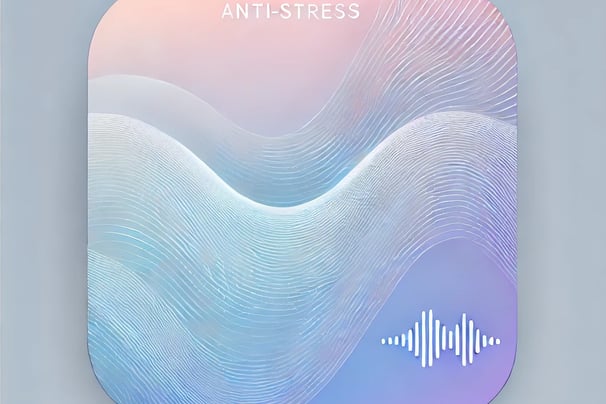How can gratitude practices help students cope with stress?
How can gratitude practices help students cope with stress? Discover the transformative power of gratitude in managing stress, building resilience, and improving academic performance. Don't miss out on this valuable insight—learn how simple practices can change the way students handle life's pressures and thrive in challenging environments.
11/22/20248 min read
How can gratitude practices help students cope with stress? In today’s academic landscape, stress is an increasingly common experience for students. Whether it's due to rigorous coursework, social pressures, or balancing multiple responsibilities, students often find themselves overwhelmed. Research shows that over 87% of students report feeling stressed, with academic performance being one of the top contributing factors.
While stress can negatively affect both mental and physical well-being, gratitude—a simple practice of acknowledging and appreciating the positives in life—offers a solution. Studies have shown that gratitude can significantly reduce stress, foster emotional resilience, and even improve academic performance. With this practice, students can shift their focus from the pressures that cause stress to the aspects of life that bring joy and fulfillment, enhancing their ability to cope with challenges in healthier ways.
For many students, coping with academic pressure: stress management tips for students becomes an essential part of navigating their studies. These practices help students prioritize self-care and identify techniques for managing the inevitable stress that accompanies their education.
Likewise, understanding how to balance study and social life in order to reduce stress in college emphasizes the importance of time management and setting boundaries to alleviate stress, especially when students juggle both academics and social obligations.
Students that have read some of our other articles are aware how much emphasis we put on the importance of time management for students and reducing stress through better organization. Namely, studies showing that organized students experience lower levels of stress. In environments where pressure is constant, this is one of the vital ways how to handle stress in high-pressure academic environments, as gratitude can help students reframe negative experiences into more manageable ones.
We would also like to mention on this place out article on stress and procrastination and breaking the cycle for academic success, beacause it emphasizes the importance of overcoming procrastination, gratitude helps students maintain motivation and focus, two crucial factors in overcoming procrastination. Building resilience to manage stress in a competitive world is very important. It underscores how gratitude helps foster resilience, equipping students with the mindset to tackle challenges confidently.
Positivity plays a crucial role in reducing stress. Our article on how does a positive mindset influence stress levels in students emphasizes how gratitude cultivates such a mindset.
Finally, it is always important to ask what can universities do to help students manage academic stress. Our article with the same title reinforces the idea that promoting gratitude-based practices on campus can provide students with the tools they need to thrive.
All of these subject are a cornerstone that enables us to head into the dicussion related to the gratitude practices and their influence on the well-being of students.


How Can Gratitude Practices Help Students Cope with Stress?
Gratitude practices help students cope with stress by providing a powerful shift in perspective. Stress often arises from focusing on perceived failures or overwhelming situations, leading to feelings of helplessness. Gratitude counters this by encouraging students to focus on the positive aspects of their lives, no matter how small. This shift in focus creates a sense of emotional stability and control, allowing students to manage stress in a healthier, more effective way.
Research has shown that gratitude acts as a buffer against the physiological effects of stress. When students regularly practice gratitude, they experience reduced production of cortisol, the stress hormone, which helps lower anxiety and improve emotional regulation. By fostering a more positive outlook, gratitude allows students to approach academic challenges with clarity and calmness, rather than fear or anxiety.
Moreover, gratitude practices can help students build emotional resilience. When students are grateful, they are more likely to view difficulties as temporary setbacks rather than insurmountable obstacles. This resilience helps them navigate the ups and downs of academic life with a stronger sense of purpose and optimism. In this way, gratitude not only alleviates the immediate effects of stress but also strengthens students' ability to manage future challenges.
The Psychological Benefits of Gratitude
The psychological benefits of gratitude extend far beyond just reducing stress. Gratitude also contributes to emotional resilience, personal growth, and a stronger sense of well-being.
Regular gratitude practices promote a more positive emotional state, enabling students to better cope with challenges and stay focused on their long-term goals.


Enhancing Emotional Resilience
One of the key psychological benefits of gratitude is its ability to enhance emotional resilience. Students who practice gratitude regularly tend to develop a more adaptive response to setbacks and challenges.
This means they are more likely to recover quickly from failures or disappointments, such as receiving a poor grade or struggling with a difficult subject. Instead of becoming disheartened, students practicing gratitude can view challenges as opportunities for growth and self-improvement.
By shifting their perspective, they maintain a positive outlook and increase their likelihood of bouncing back from stressful situations.
Reducing Negative Behaviors
Stress often leads to negative emotional responses, such as irritability, anger, or social withdrawal. Gratitude serves as an antidote to these behaviors by promoting emotional regulation and fostering a more balanced mindset.
Research has shown that students who regularly express gratitude demonstrate fewer signs of aggression or frustration when faced with stress, opting instead for calmer, more reflective responses.
Gratitude enables students to manage their emotions in healthier ways, thus contributing to improved social interactions and reducing the overall stress load.
Promoting Positivity and Meaning
In addition to its role in emotional regulation, gratitude also helps students find meaning and purpose in their academic lives. Rather than seeing school as a series of stressful tasks, students who practice gratitude often come to view their studies as part of a larger, meaningful journey.
This sense of purpose can significantly reduce feelings of burnout and enhance motivation, making academic challenges feel more manageable. Gratitude allows students to appreciate the process of learning and personal growth, not just the outcome.
This deeper sense of meaning can alleviate stress and encourage a sustained, positive attitude toward school.
The Academic Advantages of Gratitude
Gratitude practices don’t only benefit students emotionally—they also have a significant impact on academic performance.
By helping students stay focused, motivated, and emotionally balanced, gratitude provides the foundation for academic success.
Boosting Focus and Engagement
One of the most immediate academic benefits of gratitude is its ability to enhance focus. Students who practice gratitude regularly report fewer distractions, greater mental clarity, and an improved ability to engage deeply with their academic work.
By reducing stress and anxiety, gratitude allows students to concentrate more fully on their studies, making learning more effective. Gratitude has also been shown to improve overall mindfulness, which can further increase focus and performance.
Additionally, gratitude can help students become more present and engaged in classroom discussions and group work.
When students feel a sense of gratitude for their educational opportunities, they are more likely to participate actively and stay motivated throughout their studies. This greater engagement often leads to improved learning outcomes and academic performance.


Fostering Social Connections
Social support plays a key role in academic success, and gratitude is an effective tool for fostering strong, supportive relationships with peers, teachers, and family members. Students who express gratitude toward their peers and educators tend to have more positive interactions and stronger support networks.
These connections not only provide emotional and social benefits but also enhance students’ academic experience by creating a sense of community and mutual encouragement.
Gratitude can also improve students' relationships with others by encouraging empathy and kindness. By recognizing the contributions of others, students are more likely to offer support in return, strengthening their social fabric.
These positive relationships create a more collaborative and less stressful academic environment, where students feel supported both academically and emotionally.
Strengthening Psychological Traits
Gratitude can help students develop key psychological traits that are crucial for academic success. Traits such as self-efficacy, emotional intelligence, and a growth mindset are all enhanced by the regular practice of gratitude.
By regularly reflecting on the positive aspects of their lives, students are more likely to develop a sense of self-worth and confidence in their abilities. Gratitude also fosters emotional intelligence by helping students become more aware of their emotions and better at managing them.
These traits contribute directly to students’ ability to cope with academic challenges, interact positively with others, and stay motivated in the face of difficulties.
Practical Gratitude Practices for Students
Incorporating gratitude into daily routines is simple, accessible, and highly effective.
Students can engage in various gratitude practices to help alleviate stress and enhance their overall well-being.


Gratitude Journals
One of the most widely recommended gratitude practices is keeping a gratitude journal. By writing down a few things they are grateful for each day, students create a daily habit of focusing on the positive aspects of their lives.
This practice helps rewire the brain to notice opportunities for gratitude, which can have lasting effects on stress levels and emotional well-being.
Many students find that gratitude journaling provides a sense of structure and purpose, helping them maintain a positive outlook even during challenging times.
Expressing Thanks
Another powerful way to practice gratitude is by expressing thanks directly to others. Whether it’s sending a thank-you note to a teacher, verbally appreciating a classmate, or showing gratitude to family members, expressing thanks strengthens relationships and promotes a positive social atmosphere.
Gratitude interventions like these help students recognize the contributions of others and foster a sense of community and connection. In academic environments, this increased sense of connection can make stressful situations feel more manageable.


Mindful Reflection
Mindful reflection involves taking time to consciously reflect on the things in life for which we are thankful.
This practice encourages students to slow down and appreciate the small moments that bring joy, such as a good grade, a supportive friend, or even the opportunity to learn something new.
Mindful gratitude practices help students become more aware of their thoughts and emotions, allowing them to approach stressors with a greater sense of calm and balance.
Conclusion
How can gratitude practices help students cope with stress? The research is clear: gratitude not only reduces stress but also enhances emotional resilience, improves academic performance, and fosters positive social relationships.
By shifting their focus from challenges to opportunities, students can significantly improve their ability to manage stress and thrive in their academic and personal lives. Regular practices like journaling, expressing thanks, and mindful reflection have been shown to reduce stress, improve emotional regulation, and promote academic success.
In a world filled with pressure and challenges, gratitude provides students with a powerful tool to not only cope with stress but to flourish despite it.
Thanks to the contributions of several studies and researchers, we were able to write a comprehensive article, observing the subject from different angles, which greatly contributed to the understanding of the matter at hand.
Their findings shed light on the various ways gratitude impacts students' mental health, academic achievements, and resilience, enriching the insights shared in this piece.
References:
Norwawi, N. M., Yusoff, M. S., & Mohd Amin, W. A. A. W. (2021). Gratitude and its relationship to resilience and academic performance among university students. Journal of Cognitive Sciences and Human Development, 7(2), 145–158.
Wilson, J. T. (2016). Brightening the Mind: The Impact of Practicing Gratitude on Focus and Resilience in Learning. Journal of the Scholarship of Teaching and Learning, 16(4), 1–13.
Webb, M.S., Whitmire, J.B., Hills, K.J. et al. (2024). Gratitude Buffers Against the Effects of Stressful Life Events on Adolescents’ Externalizing Behavior but Not Internalizing Behavior. Contemporary School Psychology.
Kirca, A., Malouff, J., & Meynadier, J. (2023). The Effect of Expressed Gratitude Interventions on Psychological Wellbeing: A Meta-Analysis of Randomised Controlled Studies. International Journal of Applied Positive Psychology, 8, 63–86.
Atad, O.I., & Russo-Netzer, P. (2022). The Effect of Gratitude on Well-being: Should We Prioritize Positivity or Meaning?. Journal of Happiness Studies, 23, 1245–1265.
Liu, T., Yan, S., & Yang, Z. (2024). Gratitude and Adolescent Academic Performance: The Mediating Role of Different Psychological Develop Features. Journal of Education, Humanities and Social Sciences, 26, 711-715.


